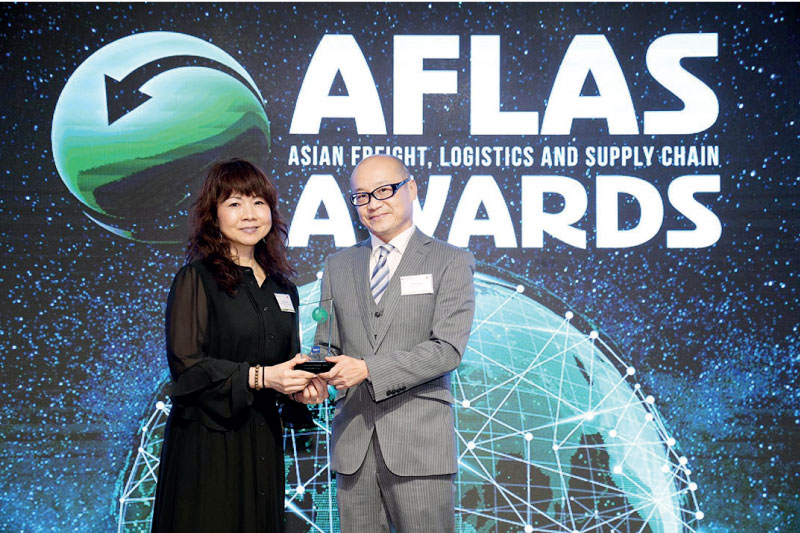Tuesday Feb 17, 2026
Tuesday Feb 17, 2026
Monday, 25 October 2021 00:00 - - {{hitsCtrl.values.hits}}

China Merchants Port Holdings Company Public Relations Director – Group Marketing and Commercial Department Catherine Chow (left) accepts the AFLAS award on behalf of CICT at the awards gala in Hong Kong
Colombo International Container Terminals (CICT) has continued its winning streak on the global stage when it was named the ‘Best Container Terminal in Asia’ in the ‘Under 4 million TEUs’ category for a record fifth consecutive year.
The winner of this prestigious award was announced on Thursday 21 October at the 2021 Asian Freight, Logistics and Supply Chain (AFLAS) awards gala at the New World Millennium Hotel in Hong Kong.
“This award is a victory not just for CICT but for the Port of Colombo, of which we are an integral part,” CICT CEO Jack Huang said. “Competition among ports is intense at the best of times and more so when the global shipping and cargo logistics sectors are faced with disruptions and challenges due to a pandemic and the resultant economic downturn. This award affirms CICT’s ability to maintain efficiency and competitiveness in the face of adversity and is a tribute to the commitment and passion of the CICT team as well as to the support we receive from the Sri Lanka Ports Authority to maintain operations at optimal levels.”
CICT, which is managed by China Merchants Port Group (CMPort), beat three other shortlisted finalists in its category – Dalian International Container Terminal (China), Jakarta International Container Terminal (Indonesia) and Laem Chabang International Terminal (Thailand) – to win the AFLAS award.
Hosted by Asia Cargo News, the AFLAS awards are designed to honour leading service providers including air and shipping lines; airports and seaports; and logistics, 3PLs and other associated industry professionals, for demonstrating leadership as well as consistency in service quality, innovation, customer-relationship management and reliability.
More than 40 different awards were presented to leading companies in the cargo, logistics and supply chain sectors at the 2021 edition of the AFLAS awards. Two new awards were introduced this year, to represent changes and growth within the industry. The ‘Best Logistics Service Provider – eCommerce’ and ‘Best Logistics Service Provider – Warehousing’ awards recognised leaders in these rapidly-evolving and expanding areas.
Commenting on the awards, their presenter said: “As ever, the awards are designed to honour the respective winning organisations for demonstrating leadership as well as consistency in service quality, innovation, customer relationship management and reliability. Many firms have shown outstanding innovation and leadership in the last 12 months, and we are sure this year’s awards will be very illuminating.”
The AFLAS winners are decided by going through a three-step process, considering industry opinions, and through nomination criteria and technical evaluation by Asia Cargo News. The shortlist of finalists is sent out to more than 15,000 readers to vote.
Huang attributed CICT’s achievement to the terminal’s continuing high levels of productivity leading to fast ship turnaround times. Nominees for the AFLAS awards are judged on adherence to criteria standards encompassing higher operational productivity, efficient turnaround of trucks delivering and picking up containers; provision of suitable container shipping-related infrastructure; cost competitiveness, customer service level and customer satisfaction; timely and adequate investment in new facilities to meet future demand; innovative operating environment, facilitation of ancillary services and ease of doing business activities; and effective and easy-to-use IT systems.
CICT manages the South Terminal of the Port of Colombo, the first deep-water terminal in South Asia, which is equipped with facilities to handle the largest vessels afloat. Since its inception in 2014, the terminal has incrementally grown the volume it has handled; from 686,639 TEUs in 2014, to 1.56 million TEUs in 2015, 2 million TEUs in 2016, 2.38 million TEUs in 2017, 2.67 million TEUs in 2018, 2.9 million TEUs in 2019 and 2.89 million TEUs in 2020.